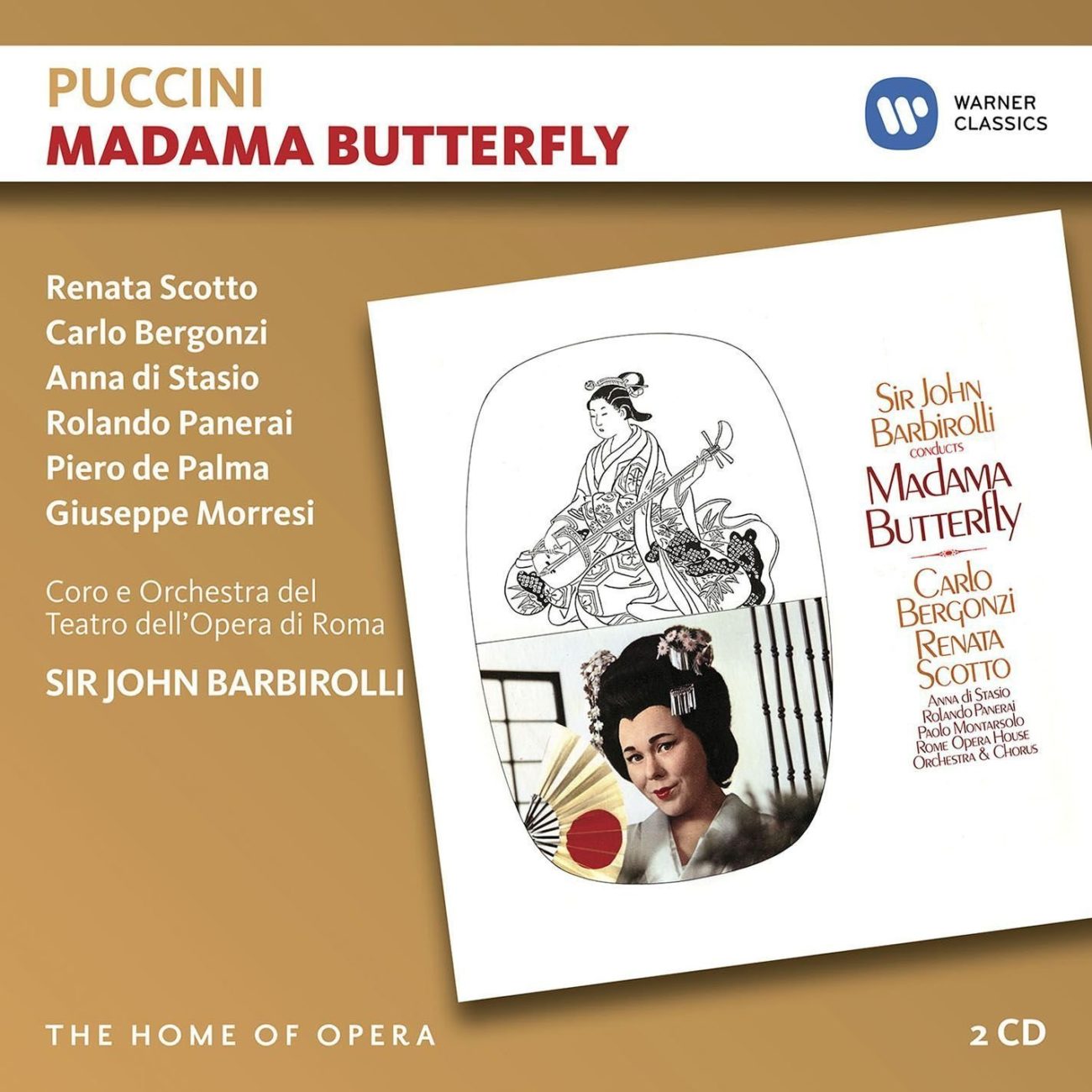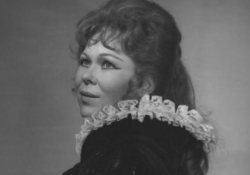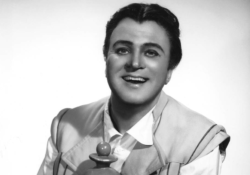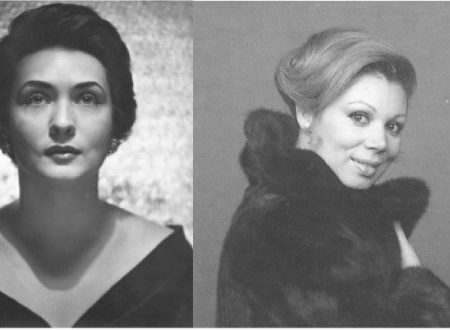Part of the Singers on Singing: Signature Roles series
To have an opportunity to read or hear the legendary great dramatic soprano Renata Scotto in any context is a treasure that is profoundly valued by music lovers and musicians around the world. To have the opportunity to preserve her detailed thoughts and observations about one of her very most famous of all roles, Cio-Cio San in Puccini’s Madama Butterfly, has been the particularly special privilege that we have been granted by Signora Scotto, who has graciously given her time to discuss the opera for the Hampsong Foundation’s Singers on Singing site. Below we are very delighted to present a transcript of the phone conversation she gave to us on the 24th of April 2018. It is accompanied by short audio extracts from her pre-eminently acclaimed Warner Classics recording of the opera with Sir John Barbirolli conducting. As is the case with the music extracts in our other Signature Roles features, we are extremely grateful to Warner Classics for their generous agreement enabling us to include their recordings in this very special historic series.
Jon Tolansky, May 2018
I had many years to absorb the character of Madama Butterfly – first of all from the short story of John Luther Long, and then from the play of David Belasco. I think it was when Puccini saw Belasco’s play in London that he decided this was the Butterfly that he wanted to set to music – this affected him more than the Luther Long story and more than the Madame Chrysanthème novel by Pierre Loti, because there was no tragedy in those works. The tragedy was born with Belasco, because he was a man of the theatre, and it is the tragedy that inspired Puccini to write an opera that is fantastic. Puccini loved the score he wrote for this opera. He loved it more than any of his other operas.
But then it was a fiasco at the premiere – and there are many reasons for that, not just one reason: there are many, many good reasons. Partly because of all the troubles, he then changed the opera from being in two acts to three acts – but I prefer it in two acts, because you can see the passage of the night while Cio-Cio San is waiting for Pinkerton: the long music through the night into the dawn.
Altogether in this opera the music is the assoluta prima donna protagonista. No other protagonist, not even Norma, is the protagonist of a woman like Butterfly. Norma I think is a great masterpiece for the character, but Butterfly is the prima donna assoluta: this is my feeling, because everything goes around her from the first moment – even before she appears.
In your autobiography you said that Cio-Cio San is a woman and not a child.
She can make-believe like a child because she is young, but she is already a woman at 15 as she has been through so much. She practically didn’t have a family as a girl. There was her father’s suicide and she had to work to make a living. Especially in the period of the beginning of the 20th Century, being a geisha was not a good job. Today it is an excellent job with rules, but I don’t think there were rules back then, except that a geisha had to play and make seductive play around a man – she had to please a man, because many Japanese men wanted this. In Madama Butterfly, Yamadoori is the figure of the person who likes a geisha, because he can play. Yamadoori is an important figure in Butterfly, I think.
That is why Cio-Cio San is so appalled and shocked that Sharpless would dare to offer her Yamadoori as a replacement for Pinkerton.
Yes but Sharpless does not understand because he is not the kind of man who goes with a geisha. Probably a geisha was invited to a party he has given – I remember I was invited to many parties in Tokyo after I had sung, and at dinner the waiter was a geisha who was seated with us at the table to serve us. But that has been Sharpless’s only experience of geishas. However the Japanese men of those times – of course they would go with geishas. The family was one thing, and having a geisha was something else. So Yamadoori is a very important figure because he represents the Japanese man of that time. In this opera each and every character is important to the plot, to what is happening to Butterfly – the small roles as well as the major ones, and they are all musically perfect. Look at Goro! Such an important figure. Even the servants, too, because they are the real Japanese people. And then Kate Pinkerton – she is the one who leads Butterfly to realise that she must kill herself. The music in this scene with Kate is colossal: “Quella donna! Che vuol da me?” – “That woman! What does she want of me?” And so many moments of silence…….silence. And in the silence, how many things happen! The thinking – and then just a single pianissimo note in the orchestra – and then silence – and then another single note in the orchestra – and then nothing. This is very great music. Puccini has immersed himself in the tragedy: Belasco’s tragedy, I am certain. Those pauses are unbelievable. And when Cio-Cio San says “paura” – “afraid” – it is the most beautiful word in the opera. Several times in the opera she says “paura”. In this scene with Kate she sings “tanta paura…..tanta paura” – “so afraid, so afraid”. “That woman makes me so afraid, so afraid”.
LISTEN TO THE AUDIO CLIP BELOW
Example 1 from “Renata Scotto discusses Madama Butterfly”
Excerpt from Giacomo Puccini’s Madama Butterfly
Madama Butterfly: Renata Scotto
Suzuki: Anna di Stasio
Sharpless: Rolando Panerai
Orchestra del Teatro dell’Opera di Roma
Conductor: John Barbirolli
Read the libretto (Italian & English) for this example here
Puccini in fact is showing us, in this terrible scene, how dignified Cio-Cio San is in her anguish.
And not only in this scene. All through the opera she has great dignity – fabulous dignity. She is always in control when she suffers – maybe this is a Japanese characteristic that Puccini had understood so well, even though he had never been to Japan: that you would not show your emotion too much, especially when it is pain. “Niente, niente” – “It’s nothing, it’s nothing” she sings as Sharpless tries to help her because she is almost fainting after he has tried to tell her that Pinkerton is not going to return.
LISTEN TO THE AUDIO CLIP BELOW
Example 2 from “Renata Scotto discusses Madama Butterfly”
Excerpt from Giacomo Puccini’s Madama Butterfly
Madama Butterfly: Renata Scotto
Sharpless: Rolando Panerai
Orchestra del Teatro dell’Opera di Roma
Conductor: John Barbirolli
Read the libretto (Italian & English) for this example here
Indeed, the real deep intensity of the character there and in the passage that follows is in the wonderful mezza voce that you give it – expressing the tremendous emotional control Cio-Cio San has at such a moment of potential shock.
You have to have this mezza voce in this role, because sometimes it shows Cio-Cio San’s delicacy and sometimes it shows her strength. Her strength and delicacy go together. Even you need to have it for parts of the seduction scene with Pinkerton. She does this seduction scene so extraordinarily well!
LISTEN TO THE AUDIO CLIP BELOW
Example 3 from “Renata Scotto discusses Madama Butterfly”
Excerpt from Giacomo Puccini’s Madama Butterfly
Madama Butterfly: Renata Scotto
Orchestra del Teatro dell’Opera di Roma
Conductor: John Barbirolli
Read the libretto (Italian & English) for this example here
But tell me – do you hate Pinkerton?
Well now…..! I will avoid your question and say that for me the most insalubrious character is Goro – do you agree?
Ah! OK! Yes absolutely – because I think I like Pinkerton. Pinkerton is the symbol of the young lad in the Navy and he goes from one port to the other – to do what? To look for a girl. And he finds a nice one – and that’s it – basta, finita. And then, what happens afterwards? Every man does that. It’s the story of the human male condition. I like Pinkerton. He is the symbol of youth and the man who doesn’t know that he is doing something bad. He just wants to have fun and have a good time. Then when he goes back home he finds a wife – an American wife. And so it is. No, I like Pinkerton.
In the way that you so interestingly say that, I feel this actually underlines the fundamental fatal truth of this opera. It is not that there is a conventional bad guy anywhere, but there is a terrible lack of awareness – and lack of true and genuine love, of course. And that’s just one of many reasons why the vocal demands on Cio-Cio San are so extremely taxing, as she has to maintain, in her voice, this extraordinary courage and belief while everything is so stacked against her.
Most certainly to sing the vocal demands of this role throughout the opera is very difficult. Puccini gives to Butterfly everything possible to do for a singer. She has to have a beautiful lyric voice, she has to have a huge dramatic voice, and additionally musically the role is very difficult. This is especially so in the two act version, which I feel is the most appropriate one. For me, the second act is two acts to perform as a single act: going from the passage of the humming chorus into the intermezzo, with the long waiting through the night, and then going on with the last scene, this is all really one continuous long act. It is greatly challenging on your voice to perform it like this, as there is no real interval, but with true control of your voice you can do it, and it is fantastic. If you think how to shape the sound you can do it. I learned this, because the first time I sang Butterfly I had almost no voice for the last scene. But, if you have a good technique and you know how to control the technique while at the same time you are giving the character and the truth to the audience – when you learn how to do that, grazie Puccini, because it is difficult but it is possible.
The truth that you mention – it is surely so remarkable that Puccini psychologically and also musically understood the very essence of Cio-Cio San and what happens to her even though he had never visited Japan.
He understood it all. He understood that when she gives up her religion for the new one, she is alone. For me, when she explains to Pinkerton that she has done this, she is telling herself what she did and what she is going to – and she believes it.
LISTEN TO THE AUDIO CLIP BELOW
Example 4 from “Renata Scotto discusses Madama Butterfly”
Excerpt from Giacomo Puccini’s Madama Butterfly
Madama Butterfly: Renata Scotto
Orchestra del Teatro dell’Opera di Roma
Conductor: John Barbirolli
Read the libretto (Italian & English) for this example here
She believes what she has done, deeply – until – the moment that she kills herself. Because, when she kills herself she becomes a Japanese woman. And she has to kill herself in the Japanese way. She would not cut her wrist. She has to do what her father did. “Con onor muore chi non può serbar vita con onore” – “To die with honour if life cannot be preserved with honour”: this is ritual, and it is Japanese ritual. Butterfly sings this on one note – a D – and I always sang the note. But – at this point she is no longer on this Earth. She is no longer a human being attached to the ground. She is already in another dimension. This is what I aimed for – so, no vibrato, and a sound that is like a prayer, like a chant. Because to kill yourself in that way, to commit the hara-kiri ritual, you are no longer on the Earth, you are already in another dimension – it is a terrible act, but if you think it is a terrible act you cannot do it.
LISTEN TO THE AUDIO CLIP BELOW
Example 5 from “Renata Scotto discusses Madama Butterfly”
Excerpt from Giacomo Puccini’s Madama Butterfly
Madama Butterfly: Renata Scotto
Orchestra del Teatro dell’Opera di Roma
Conductor: John Barbirolli
Read the libretto (Italian & English) for this example here
Altogether the role of Cio-Cio San is surely almost a dangerous experience for a woman to perform.
And for the audience to experience! The very last bar of the opera: the chord that Puccini writes – after that the audience cannot get up from their seats.
LISTEN TO THE AUDIO CLIP BELOW
Example 6 from “Renata Scotto discusses Madama Butterfly”
Excerpt from Giacomo Puccini’s Madama Butterfly
Orchestra del Teatro dell’Opera di Roma
Conductor: John Barbirolli
You know, I sang so many performances of Butterfly, but it’s very important to say that this opera was never, ever a routine. That I could not do. Before every performance I gave it some thinking over and asked myself “is it right to do that? – is it right to feel this?” It was always another new performance. But yes – it is a great emotional ordeal. I found it very difficult actually getting up at the end to take the curtain call. I remember once at the Metropolitan Opera I felt completely unable to get up. Rudolf Bing, who loved that opera so much – he thought I was really dead because I just could not get up. So he came and helped me to get up. “Are you OK?” he asked me. “Yes, I’m OK now – but I wasn’t OK five seconds ago” – because you don’t leave the character when the curtain comes down! I would have preferred not to go out for applause and just go home, because you have something that stays inside for at least 30 minutes.
Madama Butterfly (1967)
Madama Butterfly: Renata Scotto
Pinkerton: Carlo Bergonzi
Suzuki: Anna di Stasio
Sharpless: Rolando Panerai
Orchestra del Teatro dell'Opera di Roma
Conductor: John Barbirolli
Warner Classics: 0190295735913

Related Resources
audio

Singers on Singing: Renata Scotto
audio

Singers on Singing :
Maria Callas
audio

Singers on Singing :
Mirella Freni
audio

Singers on Singing :
Angela Gheorghiu
audio

Singers on Singing :
Lotte Lehmann
audio

Singers on Singing :
Renata Tebaldi
audio

Singers on Singing :
Nicolai Gedda
audio

Singers on Singing :
Giuseppe Di Stefano
TEXT FOR AUDIO EXAMPLE 1
BUTTERFLY
È qui… è qui…
dove è nascosto?
È qui… è qui…
ecco il Console…
e…dove? dove?
Non c’è.
Quella donna!
Che vuol da me?
Niuno parla!
Perché piangete?
Non, non ditemi nulla…nulla…
Forse potrei cader morta sull’attimo…
Tu, Suzuki, che sei tanto buona,
non piangere!
E mi vuoi tanto bene –
un Sì, un No, di’ piano:
vive?
SUZUKI
Sì.
BUTTERFLY
Ma non viene più.
Te l’han detto!
Vespa! voglio che tu risponda.
SUZUKI
Mai più.
BUTTERFLY
Ma è giunto ieri?
SUZUKI
Sì.
BUTTERFLY
Ah! quella donna
mi fa tanta paura!
tanta paura!
SHARPLESS
È la causa innocente
d’ogni vostra sciagura.
Perdonatele.
BUTTERFLY
Ah! è sua moglie!
Tutto è morto per me!
Tutto è finito!
SHARPLESS
Coraggio!
BUTTERFLY
He’s here, he’s here…
where’s he hidden?
He’s here… he’s here…
There’s the Consul…
and where?… where?
He isn’t here!
That woman?
What does she want at my house?
Nobody speaks!
Why are you crying?
No, don’t tell me anything…
I might fall dead on the spot.
You, Suzuki, who are so good,
don’t cry!
You love me so much –
yes or no – whisper…
Is he alive?
SUZUKI
Yes.
BUTTERFLY
But he won’t come back any more.
They’ve told you?
Serpent! Will you answer me?
SUZUKI
Never again.
BUTTERFLY
But he arrived yesterday?
SUZUKI
Yes.
BUTTERFLY
Oh, that woman makes
me feel so afraid,
so afraid!
SHARPLESS
She is the innocent cause
of all your misfortunes.
Forgive her.
BUTTERFLY
Ah! she’s his wife!
Everything is finished for me!
Everything is over! Oh!
SHARPLESS
Be brave.
TEXT FOR AUDIO EXAMPLE 2
SHARPLESS
Mi scacciate?
BUTTERFLY
Ve ne prego,
già l’insistere non vale.
SHARPLESS
Fui brutale,
non lo nego.
BUTTERFLY
Oh, mi fate tanto male,
tanto male, tanto, tanto!
Niente, niente! Ho creduto morir…
Ma passa presto come passan
le nuvole sul mare…
SHARPLESS
Are you turning me out?
BUTTERFLY
Please,
forget what I said.
SHARPLESS
I was brutal,
I don’t deny it.
BUTTERFLY
Oh, you hurt me so much,
so much, so very much!
It’s nothing, nothing! I thought I was going to die,
but it soon passes like
clouds over the sea..
TEXT FOR AUDIO EXAMPLE 3
BUTTERFLY
Vogliatemi bene, un bene piccolino,
un bene da bambino
quale a me si conviene.
Noi siamo gente avvezza
alle piccole cose,
umili e silenziose,
ad una tenerezza
sfiorante e pur profonda
come il ciel, come l’onda del mare.
BUTTERFLY
Love me with a little love,
a child-like love,
the kind that suits me.
Love me, please…
We are a people used to small,
modest, quiet things,
to a tenderness gently caressing,
yet vast as the sky
and as the waves of the sea.
TEXT FOR AUDIO EXAMPLE 4
BUTTERFLY
Ieri son salita tutta sola
in segreto alla Missione.
Colla nuova mia vita
posso adottare nuova religione.
Lo zio Bonzo nol sa,
né i miei lo sanno.
Io seguo il mio destino
e piena d’umiltà
al Dio del signor Pinkerton
m’inchino.
È mio destino;
nella stessa chiesetta
in ginocchio con voi
pregherò lo stesso Dio.
E per farvi contento potrò forse
obliar la gente mia.
Amore mio!
BUTTERFLY
Yesterday I went, alone
and in secret, to the Mission.
With my new life
I can adopt a new religion.
My uncle, the Bonze, doesn’t know,
neither do my people.
I follow my destiny
and, filled with humility,
I kneel before
Mr. Pinkerton’s God.
It is my fate.
In the same little church,
beside you on my knees,
I will pray to the same God,
and to please you I may perhaps be able
to forget my own people.
My dearest love!
TEXT FOR AUDIO EXAMPLE 5
BUTTERFLY
(Suzuki esce piangendo.
Butterfly accende un lume
davanti al reliquario, s’inchina.
Poi prende il pugnale e
lo bacia.
Legge le parole incise sulla lama.)
“Con onor muore
chi non può serbar vita con onore.”
BUTTERFLY
(Suzuki goes out, crying.
Butterfly lights a taper in
front of the sanctuary, and bows.
Then she takes her father’s knife from the wall,
kisses it,
and slowly reads the inscription on the blade.)
“He dies with honour
who cannot live with honour.”

